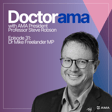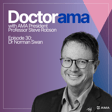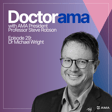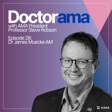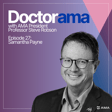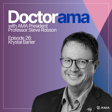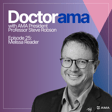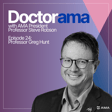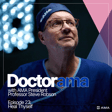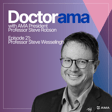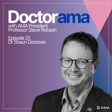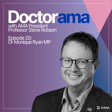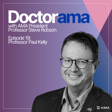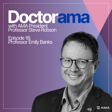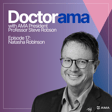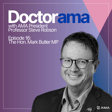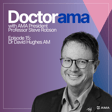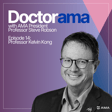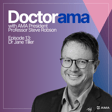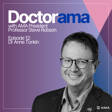Become a Creator today!Start creating today - Share your story with the world!
Start for free
00:00:00
00:00:01

Episode 4- Dr Tanya Selak
In episode 4 of Doctorama AMA President Professor Steve Robson chats with Dr Tanya Selak.
Recommended
Transcript
Post-Pandemic Pressures on Conference Organizers
00:00:00
Speaker
Ever since the pandemic, we've all been interested in getting back to big conferences again and meeting up face to face. That's put a huge amount of pressure on conference organisers. Adding to that pressure is the fact that with social media, it's possible to critique and pick your conference apart in real time.
Who is Dr. Tanya Selaka?
00:00:19
Speaker
Imagine the pressure my guest today has felt. She's just organised and run one of the biggest medical conferences in the country. She's done it living in a different city to where the conference was organised. And she's one of the biggest names on social media in the medical field herself. That sounds pretty stressful to me. So we're going to take the mask off the Twitter handle of Gong Gas Girl and find out more here on Dr Rama.
00:00:51
Speaker
You're listening to Dr Rama with Steve Robson, bringing you the best of health, medicine and people. My guest today is Dr Tanya Selaka, one of Australia's best known anaesthetists. She's also a big name on social media. Welcome to Dr Rama. Hi, thank you so much for having me. It's really exciting to be here.
00:01:13
Speaker
Well, that's great. May I call you Tanya? Of course, yes. We've been Twitter mates for years. You can call me whatever you like. We fight. I'm sorely tempted, as someone on the surgical side, to call you anesthesia. Yeah, I respond to that as well. That's fine. That's all good. Tanya, you grew up in New Zealand, I think, around Auckland. And did you train in there? Is that right? Yeah, that's right. I'm a born and bred Kiwi.
00:01:43
Speaker
I went to medical school there, started anaesthesia training, sat my exam and then went to London for a few years and then on the way back home to Auckland stopped in Wollongong for a year and that was 16 years ago. Not quite there yet.
00:02:03
Speaker
When the pandemic was on, did you find it difficult being isolated from family and the people you knew in New Zealand?
Medical Practice Across Countries
00:02:10
Speaker
Was that an issue for you? It was the most horrific thing. And really, I don't think the loneliness and the separation of the pandemic can be overstated. So I remember distinctly when Jacinta Ardern in New Zealand closed the borders to New Zealand. It was a day or two before Australia did the same.
00:02:30
Speaker
And I actually had to go into my room and cry for half an hour. And partly, I was so relieved that my family and friends in New Zealand would be protected from this wave that was coming. I was so grateful for that. But also, I'm so confronted to know that the border was closed to sort of know that you just couldn't
00:02:52
Speaker
get on a plane in Sydney and pop home to Auckland, you know, if somebody needed you, it's an extremely confronting thing to have happened to you. And obviously I'm not alone in that. Many people experienced that, but I really, I really hated it. I hated it. It was horrible. I understand necessary, but I think a personal toll that everyone took actually. And I must say when I spoke to all of my patients during that time, I'd say, how's the pandemic going for you?
00:03:22
Speaker
And everyone had a story of separation, whether it's, you know, their daughter having the first baby in Dubai in August and hoping they would get there or someone's dying in Perth or missing a wedding or a birthday or a funeral. I think that was really widespread.
Early Career Challenges in the NHS
00:03:40
Speaker
So, yeah, I wasn't fond of it. Really confronting. Yeah, I think it was so difficult for so many people. But you'd been separated from New Zealand for quite a while now.
00:03:52
Speaker
When you, I guess, moved or made that move from New Zealand to Australia, did you notice any big differences either in the way medicine is practiced or in, I guess culturally, were there any things that really stood out for you in that change?
00:04:07
Speaker
So it's really interesting to me, in my 20s leaving Auckland to go to the NHS in London for three years, I had sort of heard that the NHS was underfunded and it was really difficult to get medical care there. We're talking maybe 19 years ago now, but actually compared to the healthcare in New Zealand, I actually felt that parts of the NHS were much better funded than Auckland had been.
00:04:34
Speaker
And then I was in the NHS for about three years and then ended up in Mullingong. And again, I just feel like there's just more healthcare.
Settling in Wollongong
00:04:43
Speaker
There's more healthcare in Australia than there was in the NHS and then there was in Auckland. So where did you work in the UK?
00:04:51
Speaker
So when I arrived, I had just sat my primary anaesthetic exam in Melbourne, passed, flew home to Auckland, was there two days, and arrived in London with an interview at Chelsea Westminster. So I think I arrived on a Monday, had an interview on a Tuesday. And I said, because I'd been studying for my primary, I hadn't really planned anything. And they said, oh, because they love Aussies and Kiwis, right?
00:05:20
Speaker
especially one that had sat their exam and could do the encore. So they really like us. So they said, okay, you can have a job. When do you want to start? I was like, well, I've got no money because at the time the exchange rate, the NZ dollar to the UK pound was four to one.
00:05:38
Speaker
And to get a flat, we had to pay, it was 285 pounds a week for our flat. And that you had to pay, you know, four weeks ahead and three weeks bond. So that was all of our money. And so we couldn't even eat at McDonald's. So this is my husband and I. So we remember being at Waterloo Station looking at the McDonald's going, can we, do you reckon we could have, do you reckon we could have a cheeseburger combo? And it was like home to the nine piece soup, we've got no cash.
00:06:05
Speaker
So yeah, so I got there on Wednesday and it was like, okay, yeah, I want to work as soon as possible. So started on the Monday and those four days between arriving and starting work, I just walked around London and I just, my head exploded. It was so exciting to see all of those sites that I'd only seen on the TV and in books. I just, I couldn't believe it. Big Ben and the Thames and the Tower of London.
00:06:29
Speaker
As a kid in a candy store, it was so wonderful. So yes, I started at Chelsea in Westminster and then for three years, different people sort of handed me off to different departments in central London. It was the most wonderful time.
The Role of Humor in Medicine
00:06:43
Speaker
Yeah, look, I had a similar experience. I went to the UK probably not that much before you in the mid 90s and worked. And it was a well trodden path from people from Australia and New Zealand. Often there were jobs that were almost handed down to the next New Zealander or Australian who was arriving. And Chelsea and Westminster, what a fantastic place to work.
00:07:06
Speaker
Yeah, it was kind of interesting because people said, oh, this is a really fancy place to work. And actually, the fanciest part of it was the bus trip to get there because we lived opposite St. Thomas' Hospital in a tiny little flat. And I would go on the 211 bus every day and sit on the top of a double-decker bus in the front row and take this really cool bus trip to work. I thought that was really exciting. It never got old, right? Really, so cool.
00:07:36
Speaker
Yeah, it really is great being surrounded by all of that. You've been established in Australia for many years now. We'd almost consider you a local, but not quite. What do you like about Wollongong? What's kept you there?
00:07:50
Speaker
So it's kind of interesting, isn't it? I'm the type of person I haven't had any major life plan. It is interesting when I speak to some trainees. They've got their lives really mapped out. They're very fixed in terms of their goals and their five-year plan. I mean, that's incredible. I've never
00:08:07
Speaker
I've never been like that. So even when I was a teenager and I applied to med school, I didn't really know what medicine was, to be honest. I thought, oh, well, a kid of immigrants, people think it's a good thing to do. I thought, oh, well, it's a six-year course. By the end, I'll know what I want to do.
Organizing the ANSCA Conference
00:08:26
Speaker
And I arrived on the interview day, like my mum convinced me to not wear jeans to the interview.
00:08:33
Speaker
because I just had no idea. No one I knew was a doctor, I didn't know. Then you find out everyone else has been practicing for interviews for a year or two and they're a bit more organized. So I'm not the type to have had a plan, but we had planned, my husband's a surgeon, so we planned to stop at Wollongong for a year on the way back to Auckland and we just love it.
00:08:56
Speaker
It's just the people are really nice. It's a beautiful, the scenery's beautiful. We live on the beach. It's between the escarpment and the sea. It's quite close to a major international airport. So that was a big driver for us. So that if we needed to get home to family, we really could quite easily. There's a lot of doctors in Wollongong are like that. And it's a really beautiful community. Love the patients. And in the meantime, we bought land, built a house and had three babies.
00:09:24
Speaker
So, you know, one thing led to another. Fantastic. Absolutely. So, Tanya, I first, I guess, got to know you, albeit virtually, through following you on Twitter. And I have to say the first thing I thought was that you're completely hilarious. Do you think bringing humor to what you do is important to the way you work?
00:09:49
Speaker
I think that as doctors, we see some really, really awful things on a day-to-day basis. Just talking about medically with our patients. I mean, you're an obstetrician gynecologist, you would see, you know, you've been in rooms today, you would have seen beautiful patients and some of them will have had some very bad things happening to them. We're sort of awash with cancer and death and
00:10:18
Speaker
You know trauma it's really horrible and i think gosh. We've seen you know i've been in it twenty years i've seen a lot of really bad things as anyone any nurse doctor working in health care has.
00:10:31
Speaker
So I do think one of our coping mechanisms is this kind of sometimes black humor that we have. And I think we bond together with the things that we see and the things that we have to do. So I think, what are you going to do? Are you going to laugh or are you going to cry?
00:10:51
Speaker
I do think there is sometimes it is a bit tricky on social media though because sometimes we can say an offhand thing and it can certainly get twisted and I've certainly made errors like that before where I've forgotten that it's public, I've forgotten that maybe an offhand thing can be twisted and they're not people maybe don't understand what you're saying so it is a tricky line to tread but you know what are you going to do you can't live in fear the whole time
00:11:19
Speaker
Absolutely. Now, speaking of living in fear, organising the ANSCA conference that ran a few weeks ago must have been an extraordinary and daunting thing to have to do. And you did some wonderful things. I saw stories of runs and all sorts of things happening. Talk me through how you approached such an enormous job with such a high level of expectation around it.
00:11:44
Speaker
It was the most professionally satisfying gig of my career. It was just so wonderful to be a part of it. I think for us at ANSCA, the last in-person had been in Kuala Lumpur in 2018.
00:12:04
Speaker
sorry, 2019, you know, before the world changed. So we had a beautiful regional organising committee and the ANSCR events team.
00:12:16
Speaker
as a group effort for three years really worked hard on this thing.
Navigating Conference Social Media and In-Person Connections
00:12:21
Speaker
And our theme was be connected because we just felt like, as we talked about before with the border closures and the loneliness and the pandemic, we did really want to encourage an in-person event.
00:12:39
Speaker
quite a risky proposition in these post COVID times as to whether people want to travel and come and meet. But it was so wonderful to see everyone together and meet. People hadn't seen each other for ages. They've been through some serious ups and downs.
00:12:59
Speaker
I mean, online education is great. I've participated in lots of it. It's wonderful. But it is not the same as being in a room together, as having a cup of coffee together, having those chit chats, meeting new people, connecting with the old ones.
00:13:17
Speaker
It's just not the same. And so for me, I was just I was overwhelmed with good vibes. I mean, I ran into mentors who had taught me in Auckland years ago. And it was so nice to see them. It was so nice to hear what they'd been up to. I just it's just beautiful. So although it was a lot of work and you don't get much sleep, we do it together.
00:13:44
Speaker
So you don't feel alone, you don't feel fearful, you just feel kind of awash with the possibilities of it. I felt more sad for the people who'd gone before us, who had prepared an in-person meeting and had to change to online and I think I
00:13:59
Speaker
had a renewed appreciation of how sad that must have been. And I sort of understood it was sad at the time we made those decisions, but I think when you've really invested your heart and soul trying to work out how you're going to get all these speakers together and who's going to be going next to who and who you're putting in a session together and how that's all going to be, to not see that actually come to fruition in front of you must have been really, really tough. So kudos to them, really.
00:14:28
Speaker
So look, the meeting got rave reviews. All of my anaesthetic colleagues who came back thought it was fantastic. So congratulations to you and all of the people who worked on the ANSCA meeting. One of the big problems, and I'm sure you know this as much as me, is that meetings can be picked apart in real time. And all you need is an inadvertent mantle or some sort of off-colour event. I saw at an O&G meeting, someone got slapped last week.
00:14:58
Speaker
the unexpected can happen and really travel very quickly on social media. Was that on people's minds, organising the conference? Yeah, I think I too saw that ONG meeting with the, you know, the speaker getting slapped by an audience member. I must say, it's funny you should mention it because I contacted my
00:15:20
Speaker
team and we said, oh, there but the grace, there but the grace of God. Thank goodness. Oh, wow. We didn't have that. I think that's, I think the risk is, you know, if you get out of bed in the morning and do anything, there is a risk that something goes wrong. Like the only way you can have absolute guarantee that nothing goes wrong is that you do nothing, be nothing, say nothing.
00:15:47
Speaker
So if you want to have a risk-free life, just don't bother getting out of bed in the morning, right? But that's not a very satisfactory, you know, fun existence. So yeah, we were aware of that. I think we're pretty on the mantle issue. We're pretty primed with that.
00:16:06
Speaker
in our specialty, maybe it's easier than other specialties to avoid such a topic because we have, you know, the gender's not such a big problem in our specialty. But there are areas of anesthesia which are quite male-dominated, so the classic one is regional anesthesia. For some reason, that seems to be a very kind of man's fear. I don't know
00:16:32
Speaker
quite why that is, maybe it's changing. So yeah, we were very cognisant of that. We're very clear with our speakers about our code of conduct for our conference. And in fact, we have other organisations who have asked to borrow that so that when we ask our speakers to please contribute to our meeting, we're so grateful to them. We sort of say, well, look,
00:16:54
Speaker
These are our rules of engagement and this is what we expect of people who are participating.
Reflecting on Conference Success
00:17:00
Speaker
We really had no problem. We didn't even come anywhere near any problem with anybody. I think we went okay.
00:17:11
Speaker
I think in terms of organizing the conference, you can't please everybody. It's not possible. I think one of the contentious items for us was our college ceremony. Because the exam folk was so good at getting people through examinations and through to the end of training during the pandemic, we had an enormous number of candidates who were eligible to present at the college ceremony.
00:17:40
Speaker
And it's so sad that we had to limit the numbers who presented on that evening because we just couldn't
00:17:48
Speaker
do each of them justice. We think it's such an incredible thing to get to the end of fellowship. So we've asked some of those to come to Brisbane next year, which will also be an amazing conference. But what do you do? You do have to make some decisions so that you could have a ceremony which is really special. And I think we had 270 or so people that evening.
00:18:11
Speaker
and then went to the art gallery for a big party. So you do get little things like that where you have to make a decision and you might get some people that are not happy. So we feel bad about those things, but you just have to make a decision and go with it and explain to people what your reasonings are.
00:18:31
Speaker
and that you've thought about it and you kind of understood that it hasn't worked out for them, but that they've got the opportunity to do it next year. Look, Tanya, it's been enormous fun speaking with you this afternoon. It's wonderful that you took the time to speak with us. I hope that we can speak again. Wonderful. Thank you so much for having me.
00:18:53
Speaker
Thanks for coming on Dr. Rama. And as always, I'm not sure what the kiwi for goodbye is. My favourite New Zealand phrase is from the roads, merge like a zipper. I just wonderfully love that sign around New Zealand roads. All the best tenure. Thanks so much. All right. Bye bye. Cheers. Bye bye.
00:19:29
Speaker
You've been listening to Dr Rama, a podcast produced on Ngunnawal country by the Australian Medical Association. All rights reserved.
